Carmen, Royal Opera review - strong women, no sexual chemistry and little stage focus | reviews, news & interviews
Carmen, Royal Opera review - strong women, no sexual chemistry and little stage focus
Carmen, Royal Opera review - strong women, no sexual chemistry and little stage focus
Damiano Michieletto's new production of Bizet’s masterpiece is surprisingly invertebrate
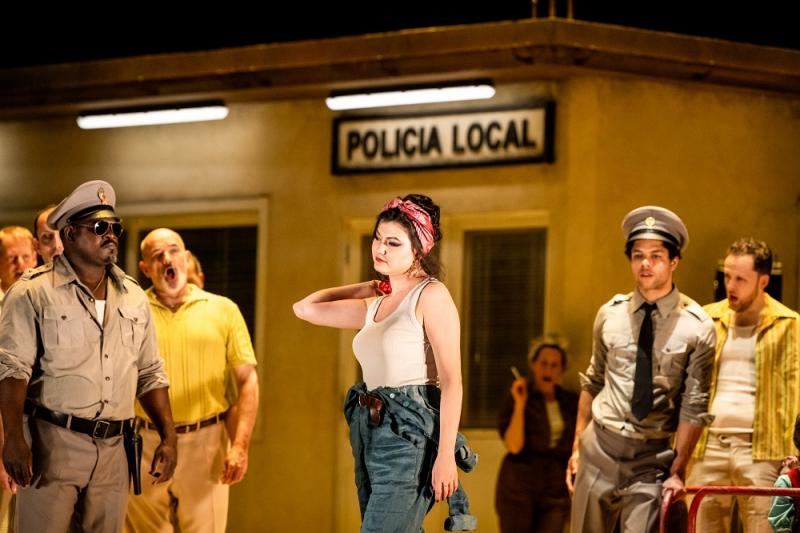
When will the Royal Opera give us a totally electrifying Carmen, rather than just a vocally perfect Carmen (as Aighul Akhmetshina surely is)? Supposed firebrand Damiano Michieletto’s production is mostly tepid after Barrie Kosky’s half-brilliant take. Kosky didn’t seem to care for his Don José or Micaëla, but as this officer turned smuggler fails to develop and the girl from his village is a plain-Jane cliché, there’s not much improvement on that front.
Ukrainian soprano Olga Kulchynska’s Micaëla (pictured below) deserves better – as nuanced a delivery as Akhmetshina’s, promising great things for the Puccini roles. The Act Three scene where she spots a rifle in the corrugated-iron shed where the smugglers keep their contraband, while José picks a fight with Escamillo outside, is one of the few telling uses of Paolo Fantin’s room-plus-big-open-space revolving set. This Carmen gets off to an unfocused start with way too many men – townsfolk mostly rather than policemen – lounging around in the heat. 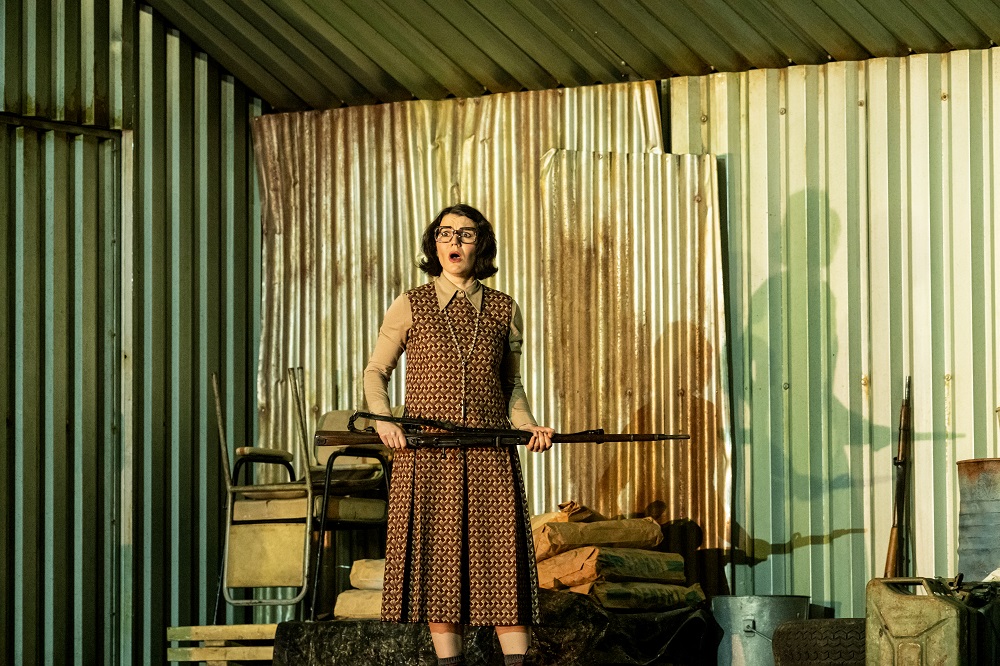 The choral scenes are superbly sung, every dynamic observed, but very loosely staged, with generic hand-waving and jumping up and down. Kids get to have fun in what smacks too much of a "give them a family-friendly show" edict. Bizet’s brilliant interweaving of piccolo mock-march with trumpet calls just becomes jeux d’enfants with no purpose (though several good kiddy screams), and the idea of having them hold up signs in front of the drop-curtain between each act is charming, but unless you see Bizet’s orchestral interludes as childlike – I don’t – jarring. And what’s this about “the following night” after José is forced to join the enterprise of Carmen’s friends? She has no time to get tired of him (surely the Entr’acte speaks of a brief love idyll).
The choral scenes are superbly sung, every dynamic observed, but very loosely staged, with generic hand-waving and jumping up and down. Kids get to have fun in what smacks too much of a "give them a family-friendly show" edict. Bizet’s brilliant interweaving of piccolo mock-march with trumpet calls just becomes jeux d’enfants with no purpose (though several good kiddy screams), and the idea of having them hold up signs in front of the drop-curtain between each act is charming, but unless you see Bizet’s orchestral interludes as childlike – I don’t – jarring. And what’s this about “the following night” after José is forced to join the enterprise of Carmen’s friends? She has no time to get tired of him (surely the Entr’acte speaks of a brief love idyll).
Michieletto gets around inconvenient detail by cutting the dialogue to a bare minimum: no time, for instance, for Escamillo to check Carmen’s availability out in Act Two. In that respect this version isn’t so much better than Kosky’s mostly spoken-word-free radicalization. And radical this isn’t. Michieletto’s one strong idea is the old lady in black (Ruth Alfie Adams pictured below with Piotr Beczala) who first appears as the “fate” theme seizes us by the throat after the pasodoble brilliance of the Prelude (a fabulous start from Antonello Manacorda conducting a full-throttle Royal Opera Orchestra which is soon let down by unnecessary lingerings and sometimes poor co-ordination with the singers). 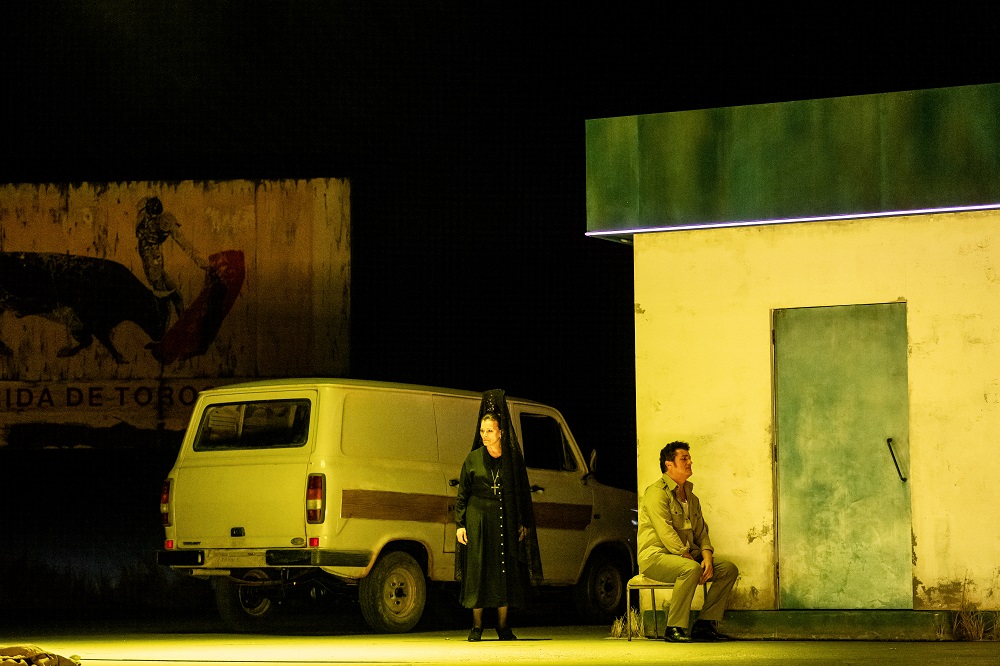 “It’s that woman again” said the gentleman in front of me to his neighbour as she reappeared, predictably on cue and in a sickly greenish-yellow light, to later musical iterations of a terrible destiny. Would you have got that it was supposed to be Don José’s mother? I didn’t, and soon gave up on reading Michieletto’s observations in the programme, which didn’t translate into action.
“It’s that woman again” said the gentleman in front of me to his neighbour as she reappeared, predictably on cue and in a sickly greenish-yellow light, to later musical iterations of a terrible destiny. Would you have got that it was supposed to be Don José’s mother? I didn’t, and soon gave up on reading Michieletto’s observations in the programme, which didn’t translate into action.
As in so many productions. the lead character doesn't add up, though Akhmetshina is perfect in every set piece and pops out an amazingly brilliant top note for a mezzo (the role can be taken by a soprano) at the end of the Seguidille. Carmen, though, is nothing on stage without sexual chemistry between the gypsy and the man she seduces. Though there can be various approaches, the benchmark for feral intensity will always be the dream pair of Elīna Garanča and Roberto Alagna in Richard Eyre’s 2010 Met production (get it on DVD if you haven’t bought tickets for this, and the visceral drama will grab you). There’s more than one way to do it, but surely the relationship has to be a hands-on one. 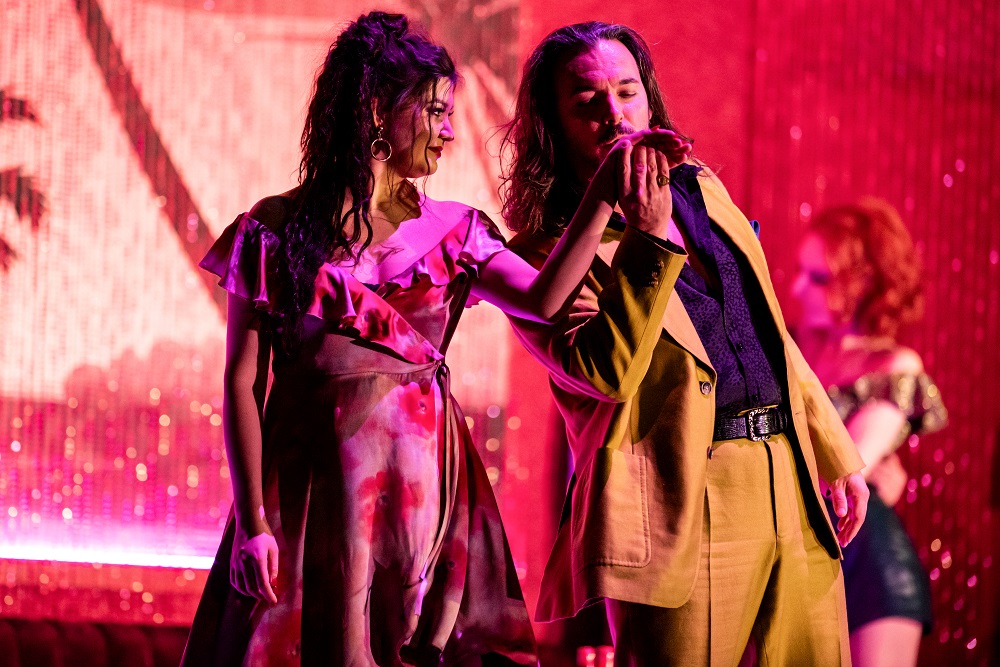 Piotr Beczala is secure, loud – except in the now-obligatory pianissimo, head-voice top B flat in the Flower Song, not delivered to Carmen at all – and despite a few stylized clinches, not involved with his woman. He seems hostile to Micaëla until the very end of their duet – the music breathes tenderness, though not sexual love – and hardly traps Carmen outside what we must suppose is the bullring in the final duet: “let me go” and “let me pass” go for nothing when he’s nowhere near her. I imagine stage animal Brandon Jovanovich will make a very different impression in the alternative cast (where Vasilisa Berzhanskaya takes over the role of Carmen).
Piotr Beczala is secure, loud – except in the now-obligatory pianissimo, head-voice top B flat in the Flower Song, not delivered to Carmen at all – and despite a few stylized clinches, not involved with his woman. He seems hostile to Micaëla until the very end of their duet – the music breathes tenderness, though not sexual love – and hardly traps Carmen outside what we must suppose is the bullring in the final duet: “let me go” and “let me pass” go for nothing when he’s nowhere near her. I imagine stage animal Brandon Jovanovich will make a very different impression in the alternative cast (where Vasilisa Berzhanskaya takes over the role of Carmen).
Kostas Smoriginas’s Escamillo is a shabby spiv in a lime-green suit (pictured above with Akhmetshina), no charismatic holder of the stage. Michieletto doesn't seem much interested in choreographing the fight he's goaded to in Act Three – no wonder Bizet's interesting extra music in which the toreador worsts the bandit and spares him is cut, as there's just a bit of shoddy matador-bull play. Call in a fight director! Michieletto's notion that Carmen then comes close to José in the moments before he leaves for his village is pure sentimentality, belied by his violent, desperate music. 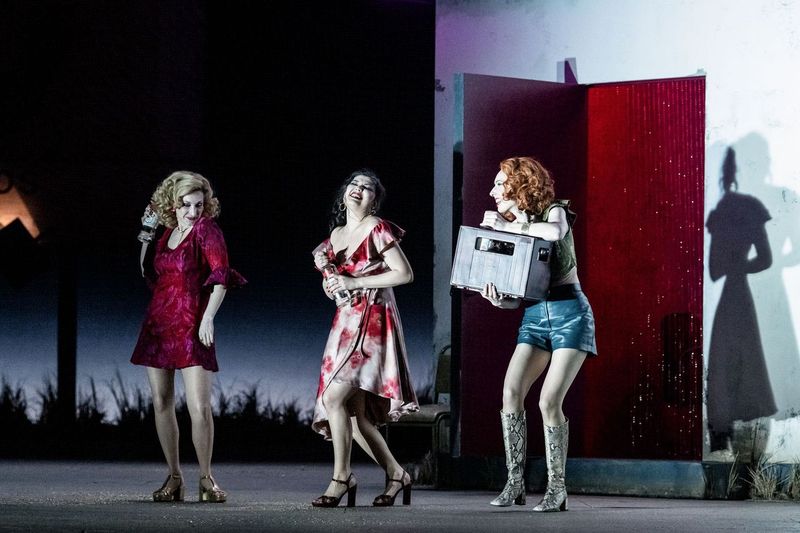 The smaller roles are all well taken. Royal Opera Jette Parker Young Artists of huge promise Sarah Dufresne and Gabrielė Kupšytė are as vivid a pair of frivolous friends as you’re likely to see or hear (pictured above with Akhmetshina centre).The tenet that in the nimble Opéra-Comique numbers it’s always good to have a Frenchman or two with you is borne out perfectly by Vincent Ordonneau as Remendado and Pierre Doyen as Dancaïre. Despite the splendidly sung Quintet, Act 2 doesn’t really spark, and surely it needs a choreographer (we got it, and how, from Otto Pichler for Kosky).
The smaller roles are all well taken. Royal Opera Jette Parker Young Artists of huge promise Sarah Dufresne and Gabrielė Kupšytė are as vivid a pair of frivolous friends as you’re likely to see or hear (pictured above with Akhmetshina centre).The tenet that in the nimble Opéra-Comique numbers it’s always good to have a Frenchman or two with you is borne out perfectly by Vincent Ordonneau as Remendado and Pierre Doyen as Dancaïre. Despite the splendidly sung Quintet, Act 2 doesn’t really spark, and surely it needs a choreographer (we got it, and how, from Otto Pichler for Kosky).
In short, the vocal pleasures are many, and would pass muster on the radio. But as a drama, set up and perfectly paced by Bizet in one of opera’s most miraculous scores, this doesn’t begin to spark. Hopes run higher for Glyndebourne’s coming production conducted by Robin Ticciati, in which Akhmetshina appears in the second run of performances, and an Edinburgh Festival airing of Andreas Homoki’s fascinating Opéra-Comique metatheatre.
rating
Explore topics
Share this article
more Opera
 Götterdämmerung, LPO, Jurowski, RFH review - outside looking and listening in, always with fascination
Every orchestral phrase and colour perfect, vocal drama often a notch below
Götterdämmerung, LPO, Jurowski, RFH review - outside looking and listening in, always with fascination
Every orchestral phrase and colour perfect, vocal drama often a notch below
 Simon Boccanegra, Hallé, Elder, Bridgewater Hall, Manchester review - thrilling, magnificent exploration
Verdi’s original version of the opera brought to exciting life
Simon Boccanegra, Hallé, Elder, Bridgewater Hall, Manchester review - thrilling, magnificent exploration
Verdi’s original version of the opera brought to exciting life
 Aci by the River, London Handel Festival, Trinity Buoy Wharf Lighthouse review - myths for the #MeToo age
Star singers shine in a Handel rarity
Aci by the River, London Handel Festival, Trinity Buoy Wharf Lighthouse review - myths for the #MeToo age
Star singers shine in a Handel rarity
 Carmen, Royal Opera review - strong women, no sexual chemistry and little stage focus
Damiano Michieletto's new production of Bizet’s masterpiece is surprisingly invertebrate
Carmen, Royal Opera review - strong women, no sexual chemistry and little stage focus
Damiano Michieletto's new production of Bizet’s masterpiece is surprisingly invertebrate
 La scala di seta, RNCM review - going heavy on the absinthe?
Rossini’s one-acter helps young performers find their talents to amuse
La scala di seta, RNCM review - going heavy on the absinthe?
Rossini’s one-acter helps young performers find their talents to amuse
 Death In Venice, Welsh National Opera review - breathtaking Britten
Sublime Olivia Fuchs production of a great operatic swansong
Death In Venice, Welsh National Opera review - breathtaking Britten
Sublime Olivia Fuchs production of a great operatic swansong
 Salome, Irish National Opera review - imaginatively charted journey to the abyss
Sinéad Campbell Wallace's corrupted princess stuns in Bruno Ravella's production
Salome, Irish National Opera review - imaginatively charted journey to the abyss
Sinéad Campbell Wallace's corrupted princess stuns in Bruno Ravella's production
 Jenůfa, English National Opera review - searing new cast in precise revival
Jennifer Davis and Susan Bullock pull out all the stops in Janáček's moving masterpiece
Jenůfa, English National Opera review - searing new cast in precise revival
Jennifer Davis and Susan Bullock pull out all the stops in Janáček's moving masterpiece
 theartsdesk in Strasbourg: crossing the frontiers
'Lohengrin' marks a remarkable singer's arrival on Planet Wagner
theartsdesk in Strasbourg: crossing the frontiers
'Lohengrin' marks a remarkable singer's arrival on Planet Wagner
 Giant, Linbury Theatre review - a vision fully realised
Sarah Angliss serves a haunting meditation on the strange meeting of giant and surgeon
Giant, Linbury Theatre review - a vision fully realised
Sarah Angliss serves a haunting meditation on the strange meeting of giant and surgeon
 Der fliegende Holländer, Royal Opera review - compellingly lucid with an austere visual beauty
Bryn Terfel's Dutchman is a subtly vampiric figure in this otherworldly interpretation
Der fliegende Holländer, Royal Opera review - compellingly lucid with an austere visual beauty
Bryn Terfel's Dutchman is a subtly vampiric figure in this otherworldly interpretation
 The Magic Flute, English National Opera review - return of an enchanted evening
Simon McBurney's dark pantomime casts its spell again
The Magic Flute, English National Opera review - return of an enchanted evening
Simon McBurney's dark pantomime casts its spell again

Add comment